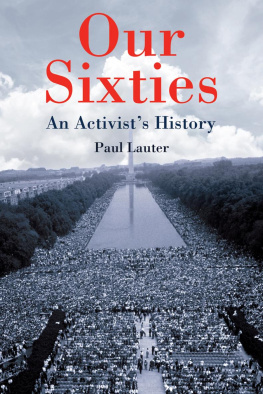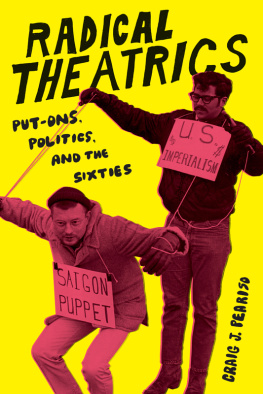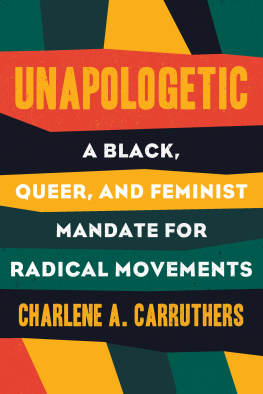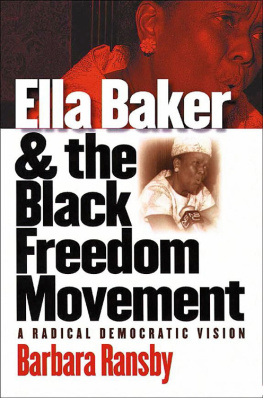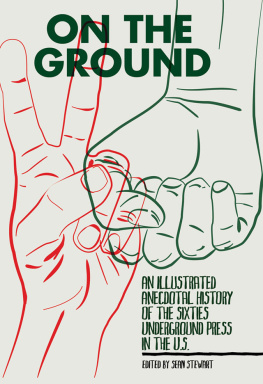mr u will not be missed. Copyright 1944, (c) 1972, 1991 by the Trustees for the E. E. Cummings Trust, from Complete Poems: 19041962 by E. E. Cummings, edited by George J. Firmage. Used by permission of Liveright Publishing Corporation.
Lines from Why Did I My Donts by Sandra Ann Harris, I want to walk the streets of a town by Alice Jackson, and A Negro Condition by Lillie Mae Powell. Excerpted from Letters from Mississippi , edited by Elizabeth Sutherland Martnez. Original edition copyright 1965 and renewed 1993 by Elizabeth Sutherland Martnez. New edition copyright 2002 by Elizabeth Sutherland Martnez. Reprinted with the permission of The Permissions Company, LLC on behalf of Zephyr Press, zephyrpress.org.
Beautiful Wreckage, by W. D. Erhart. From Thank You for Your Service: Collected Poems copyright 2019 W. D. Ehrhart, by permission of McFarland & Company Inc., Box 611, Jefferson, NC 28640. www.mcfarlandbooks.com .
Excerpt from Life at War by Denise Levertov, from Poems 19601967 , copyright 1966 by Denise Levertov. Reprinted by permission of New Directions Publishing Corp. For distribution in Europe, UK and Commonwealth (excluding Canada), excerpt from Life at War by Denise Levertov, from New Selected Poems (Bloodaxe Books, 2003). Reproduced with permission of Bloodaxe Books. www.bloodaxebooks.com .
The lines from Diving into the Wreck. Copyright 2016 by the Adrienne Rich Literary Trust. Copyright 1973 by W.W. Norton & Company Inc. The lines from The Phenomenology of Anger. Copyright 2016 by the Adrienne Rich Literary Trust Copyright 1973 by W.W. Norton & Company Inc. The lines from Transcendental Etude. Copyright 2016 by the Adrienne Rich Literary Trust. Copyright 1978 by W.W. Norton & Company Inc., from Collected Poems: 19502012 by Adrienne Rich. Used by permission of W.W. Norton & Company Inc.
Black Poet, White Critic, by Dudley Randall, 1968, reproduced courtesy of Melba Joyce Boyd, Executive, Dudley Randall Literary Estate.
Copyright 2020 by Paul Lauter
All rights reserved . Except as permitted under current legislation, no part of this work may be photocopied, stored in a retrieval system, published, performed in public, adapted, broadcast, transmitted, recorded, or reproduced in any form or by any means, without the prior permission of the copyright owner.
First published 2020
University of Rochester Press
668 Mt. Hope Avenue, Rochester, NY 14620, USA
www.urpress.com
and Boydell & Brewer Limited
PO Box 9, Woodbridge, Suffolk IP12 3DF, UK
www.boydellandbrewer.com
This work is a memoir. The experiences and conversations recounted here are the result of the authors recollection and are rendered as a subjective accounting of events that occurred in his life. His perceptions and opinions are entirely his own and do not represent those of the publisher.
ISBN-13: 978-1-58046-990-6
eISBN-13: 978-1-80010-016-9
Cataloging-in-Publication data available from the Library of Congress.
This edition published 2020
For Doris
In the Morning, In the Evening, Aint We Got Fun
(Ray Egan and Gus Kahn, 1921)
ACKNOWLEDGMENTS
M any, many friends and colleagues have contributed to this book, so I want to start with the most important: my compaera Doris Friedensohn. Not a single paragraph in this book, indeed not a single sentence, has remained unimproved by her charmed editorial pencil. And that doesnt begin to say anything about her support and encouragement over the many years Ive plugged away at this project. Dedicating Our Sixties to her is only a tiny gesture of thanks.
The members of my two writing groups have heard or read versions of most of my chapters. They have helped me to refine what I was trying to get at and to revise the prose I placed before them. Thank you to Erica Burleigh, Bettina Carbonell, Susan Harris, and the late Chris Suggs for their intensive reading. And to Marc Bernstein, Joseph Chuman, and Patricia Lefevere for hearing me out on numerous occasions.
Diana Hume George, my sometime buddy at union meetings, edited much of the text and considerably improved it. Alice Kessler Harris helped me turn what I was doing toward credible social and cultural history, and Rachel Brownstein made the connection for me with the University of Rochester Presstheir confidence in what I was doing helped me move forward. Louis Kampf, as he always does, corrected and argued with me about many parts of this story, especially those events on which we had worked together. Tris Farnsworth read and most usefully commented on early chapters, as did Judith Coburn and Trudy Johnson-Lenz. Ellen Schrecker gave me the wisdom of a historian, as we both tried to clarify the story of the New University Conference. Erika Gottfried wonderfully supplemented my own archive and provided very helpful comments. Howard Levy steered me back on course when I went off into rhetoric and, with James Lewes, helped me more fully understand the GI antiwar movement. As a frequent comrade, Claudia Piper helped me to see what our activism aspired to and accomplished. Caryl Ratner shared her knowledge of film in most helpful ways. And Sandy Zagarell, as ever, challenged and improved what I was trying to say.
Trinity College has supported this project both academically and financially, and I am indebted to the college for all its help. My wonderful colleagues in the English Department have assisted and sustained me over the many years it took to complete this work; thank you in particular Chloe Wheatley, Chris Hager, Cindy Butos, David Rosen, Francisco Goldman, Lucy Ferriss, Margaret Grasso, Milla Riggio, Sheila Fisher.
Archivists at Smith, Amherst, the University of Massachusetts/ Amherst, and particularly Trinity helped me a lot. I want to thank Nanci Young and Alex Asal, Blake Spitz and James Kelly, and Rick Ring, Henry Arneth, and others at the Watkinson Library at Trinity College, where my own archive is located.
Dick and Mickey Flacks gave me a model for my own work in their terrific memoir, Making History / Making Blintzes . They have also provided much help along the way for me, not to speak of vital friendship and encouragement.
Sonia Kane, the editorial director of the University of Rochester Press, the people she selected to read my manuscript, and her intern, Samantha Vaccaro, have been most supportive; this book is much the better for their criticisms and counsel.

Our Sixties was completed, set in type, indexed, and ready to go just before the lethal events of 2020 began. It preceded COVID-19 and its millions of victims; the police murder of George Floyd and the powerful Black Lives Matter demonstrations that have followed; also my personal struggle against the return of lung cancer. Had such events come first, this might have been a different book, one reflecting a world more dramatically fractured than the one I write about here. In the Sixties, we did not perceive our world as irreparably broken. We believedcertainly I didthat we could redirect our society to end white supremacy, militarism, imperial aggression, male dominion, and other forms of illegitimate authority. My fundamental acknowledgment remains to my comrades in the Movement, with whom I worked, from whom I learned, and to whom I owe such virtues as this book may possess.

